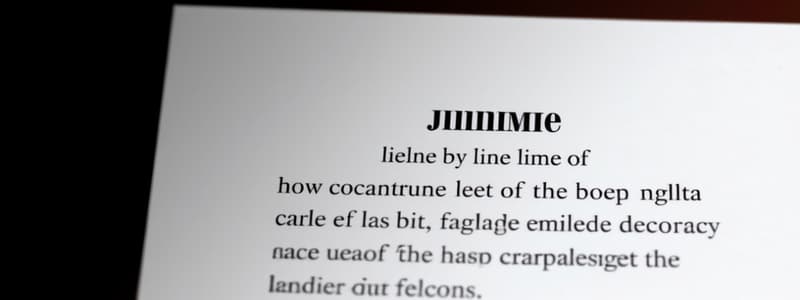Podcast
Questions and Answers
What right is protected under Section 1 of the Bill of Rights?
What right is protected under Section 1 of the Bill of Rights?
- Right to life, liberty, and property (correct)
- Right to privacy
- Freedom of religion
- Right to assemble
Under what condition can evidence obtained unlawfully be used in court?
Under what condition can evidence obtained unlawfully be used in court?
- If it supports the case
- If presented by a prosecutor
- If it reveals new information
- It cannot be used at all (correct)
What does Section 4 of the Bill of Rights protect?
What does Section 4 of the Bill of Rights protect?
- Right to free education
- Right to work
- Right to bear arms
- Freedom of expression and assembly (correct)
What is required for an individual to be denied the right to travel according to Section 6?
What is required for an individual to be denied the right to travel according to Section 6?
What does Section 9 state regarding private property?
What does Section 9 state regarding private property?
Which of the following rights does Section 12 guarantee to an individual under investigation?
Which of the following rights does Section 12 guarantee to an individual under investigation?
What does Section 7 emphasize about the right to information?
What does Section 7 emphasize about the right to information?
What does Section 5 protect regarding religion?
What does Section 5 protect regarding religion?
According to Section 8, what can workers in public and private sectors do?
According to Section 8, what can workers in public and private sectors do?
What is stated in Section 10 regarding contracts?
What is stated in Section 10 regarding contracts?
Flashcards are hidden until you start studying
Study Notes
Preamble
- The Philippine Constitution is established by the sovereign Filipino people, seeking divine guidance.
- Goals include building a just and humane society, promoting common good, and securing blessings of democracy and independence.
- Emphasizes rule of law, truth, justice, freedom, love, equality, and peace as foundational values.
Bill of Rights
Section 1
- Guarantees life, liberty, and property rights.
- Emphasizes due process and equal protection under the law.
Section 2
- Protects people against unreasonable searches and seizures.
- Mandates that warrants require probable cause verified by a judge after witness examination.
Section 3
- Affirms the inviolability of communication and correspondence privacy.
- Establishes that evidence obtained illegally is inadmissible in court.
Section 4
- Safeguards freedom of speech, expression, and press.
- Protects the right to assemble peacefully and petition the government for grievances.
Section 5
- Prohibits laws that establish or restrict religious practices.
- Ensures free exercise of religious beliefs and no religious tests for civil or political rights.
Section 6
- Protects the right to change abode and travel, subject only to lawful court orders and national interests.
Section 7
- Recognizes the people's right to information on public matters.
- Ensures access to official records and data for policy development, within legal limits.
Section 8
- Affirms the right to form unions, associations, or societies, provided they comply with laws.
Section 9
- States that private property cannot be taken for public use without just compensation.
Section 10
- Prohibits laws that impair the obligation of contracts.
Section 11
- Ensures free access to courts and legal assistance, particularly for individuals in poverty.
Section 12
- Grants rights to individuals under investigation, including the right to remain silent and to counsel.
- Affirms that the right to legal representation cannot be waived except in writing and with counsel present.
- Prohibits torture and coercive measures that compromise free will.
Studying That Suits You
Use AI to generate personalized quizzes and flashcards to suit your learning preferences.



